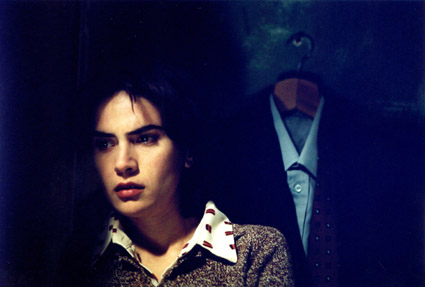|
Reviews of Recent Independent, Foreign, & Documentary Films in Theaters and DVD/Home Video
GOOD MORNING NIGHT (BUONGIORNO, NOTTE) A young couple sleeping in a double-bed with a crucifix overhead would be a picture of normality if not for the man being fully dressed, or the two armed men stationed in the apartment. Behind the floor-to-ceiling bookcase with its trick door lies one of Italy's most important post-war politicians, Aldo Moro, confined to a makeshift cell draped with the flag of the Red Brigade. Depicting the cataclysmic 1978 event that led to Moro's assassination, director Marco Bellocchio takes a pragmatic and complex position by telling the story of the former prime minister's imprisonment through the eyes of the fictional Chiara, the sole woman in this gang of four. (The irony won't be lost that she becomes the chief cook for her Marxist brethren.) Often scenes are filmed from her point of view, as she gazes into the cell through a peep hole, unobserved by Moro. At first she can't believe her luck in being part of the capture of the man most likely to be Italy's president. But her determination melts during the claustrophobic two-month confinement, especially after she reads Moro's letter to his wife. Her vulnerability does not make her politics sympathetic. Bellocchio doesn't let us, or the kidnappers, forget the five men killed in the abduction of Moro - three policeman and two bodyguards - by these radicals who claim they answer only to the working class. News footage of the men's funeral and other events surround the kidnapping - Pope Paul VI demanding Moro's release - succinctly provide a backdrop for those not in the know, though references to the country's convoluted political landscape will have resonated more with an Italian audience (the film was released there in 2003). However, if the terrorists are at all empathetic it's because of the cast. Their frightened reaction at an unexpected knock at the front door or the appearance of a cop at Chiara's workplace is contagious. For those fortunate to have seen The Best of Youth earlier this year, here's another opportunity to see Luigi Lo Cascio, this time as a terrorist, and in particular Maya Sansa as Chiara.
Clearly Bellocchio's middle-class militants are delusional; watching the
news they complain aloud for their own televised cheering rally, believing
in an imminent Communist revolution. And as the rest of her cell try and
sentence Moro to death, Chiara retreats more into a blissful, nonviolent
dream world. One daydream is cleverly expressed via stock footage of a
Soviet May Day parade accompanied by the "Triumphant March" from
Aida. In her concluding fantasy, Moro walks away from his captors a
free man just as the sun rises. In reality, the 61-year-old was found
bullet-ridden, stuffed in the trunk of a car. By making Chiara more
good-natured, Bellocchio softens the blow, not adding fuel to the fire.
Though in the epilogue, Bellocchio lets the facts speak for themselves -
Moro's assassins today are on parole. Kent Turner
|
